#ibrahim abu lughod
Text
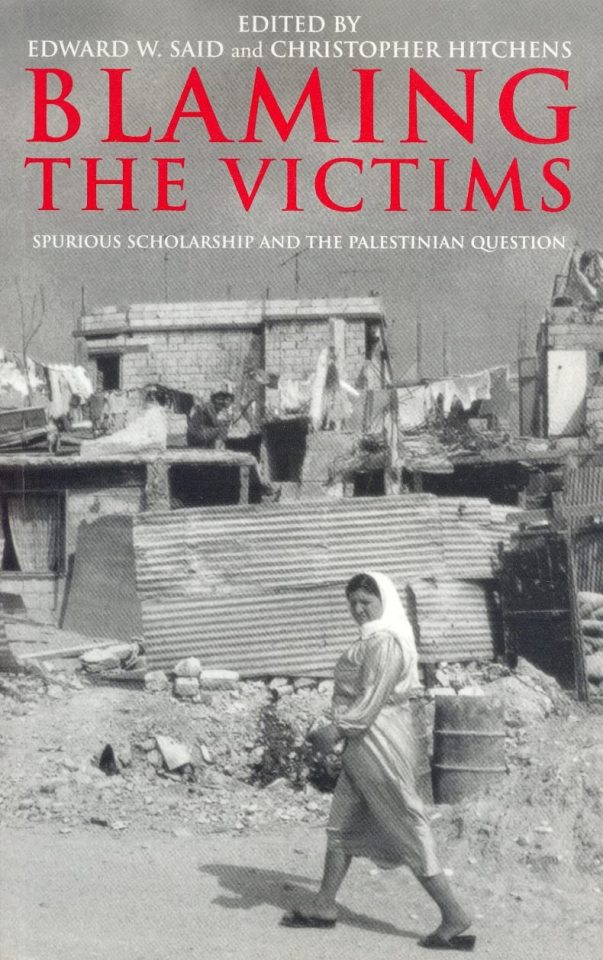
Blaming the Victims. Spurious Scholarship and the Palestinian Question, Edited by Edward W. Said and Christopher Hitchens, Verso, London and New York, NY, 1988
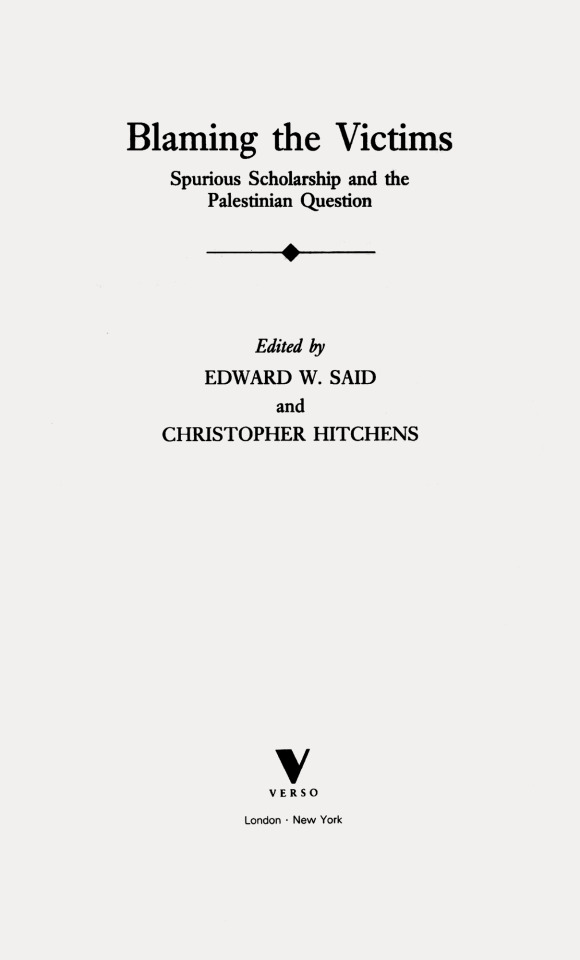
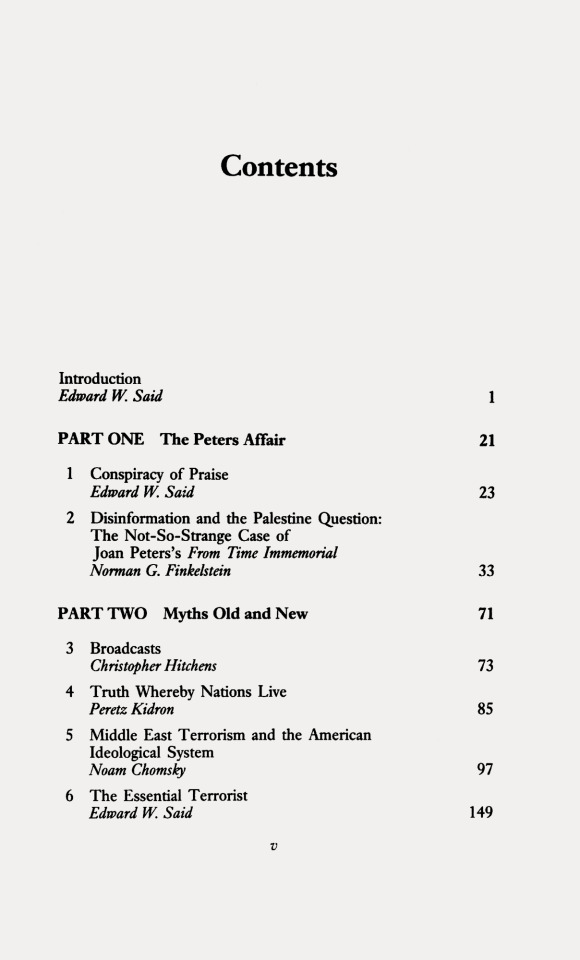
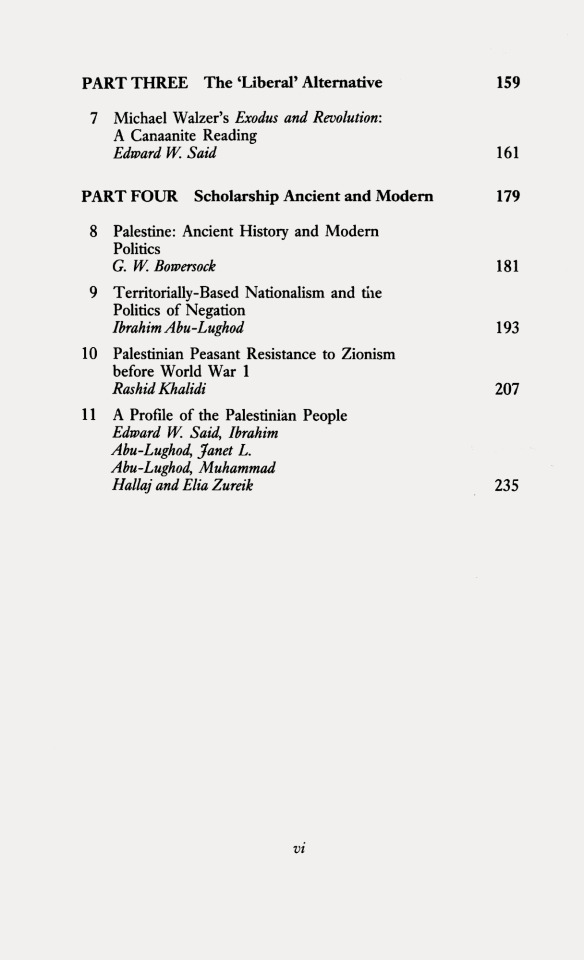
Contributors: Ibrahim Abu-Lughod, Janet L. Abu-Lughod, G.W. Bowersock, Noam Chomsky, Norman G. Finkelstein, Muhammad Hallaj, Rashid Khalidi, Peretz Kidron, and Elia Zureik
#graphic design#history#historiography#book#cover#book cover#edward w. said#edward said#christopher hitchens#ibrahim abu lughod#g. w. bowersock#noam chomsky#norman g. finkelstein#muhammad hallaj#rashid khalidi#peretz kidron#elia zureik#1980s
151 notes
·
View notes
Text
versobooks has made six e-books on Palestine free to download on their website (click), including:
• “Ten Myths About Israel”
By Ilan Pappe
• “Palestine Speaks”
Edited by Mateo Hoke and Cate Malek
• “Blaming the Victims”
Contributions by Ibrahim Abu-Lughod, Janet L. Abu-Lughod, G.W. Bowersock, Noam Chomsky, Norman G. Finkelstein, Muhammad Hallaj, Rashid Khalidi, Peretz Kidron and Elia Zureik
Edited by Christopher Hitchens and Edward W. Said
• “The Case for Sanctions Against Israel”
Contributions by Ra'anan Alexandrowicz, Merav Amir, Hind Awwad, Mustafa Barghouthi, Omar Barghouti, Dalit Baum, Joel Beinin, John Berger, Angela Davis, Nada Elia, Marc H. Ellis, Noura Erakat, Neve Gordon, Ran Greenstein, Ronald Kasrils, Jamal Khader, Naomi Klein, Paul Laverty, Mark LeVine, David Lloyd, Ken Loach, Haneen Maikey, Rebecca O'Brien, Ilan Pappe, Jonathan Pollak, Laura Pulido, Lisa Taraki, Rebecca Vilkomerson, Michael Warschawski and Slavoj Žižek
Edited by Audrea Lim
• “The Punishment of Gaza”
By Gideon Levy
• “The Palestine Laboratory”
By Antony Loewenstein
they were very easy to download; just input your payment details and it’ll cost you nothing.

once you receive the confirmation e-mail (like the picture above), press on “download e-book.” for apple users, once the e-book has downloaded, press on the ↓ arrow on the bar at the bottom of your screen:

then press “downloads” and press on the e-book file. this will take you to this app:

then it’ll automatically take you to the cover page and the rest of the book. all the books you’ve downloaded will be on this app.

remember, the enemy of fascism and its propaganda is the thirst for knowledge and knowledge itself.
#peace is not the answer; liberation is the answer#resources#palestine#free palestine#gaza#free gaza
56 notes
·
View notes
Text
0 notes
Text
The Selected Works of Edward Said, 1966 – 2006
❍❍❍
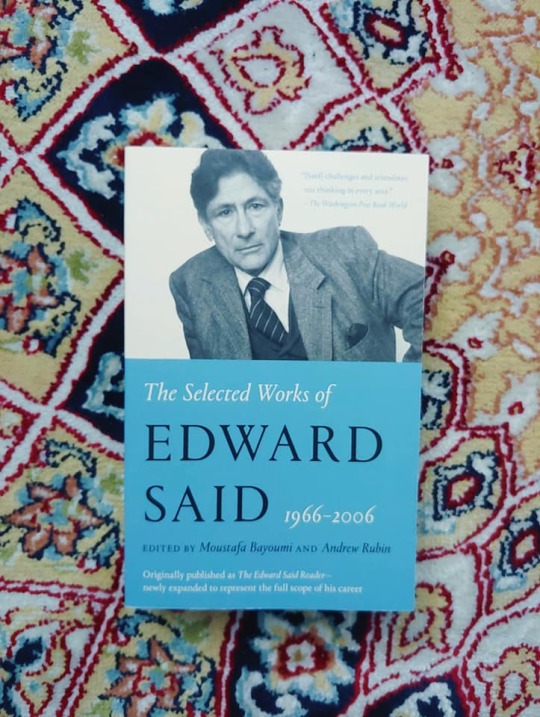
Originally published as The Edward Said Reader, this is a new edition from Vintage with a preface by Maryam Said, Edward Said’s wife. It is a chunky book that has about 600 pages. The collection is selected from Said’s earliest works to his posthumously published works in 2006. Even though I have read several books by Said, reviewing this book gave me another angle to Edward Said’s great oeuvre. Said’s work had a long-lasting impact not only on a range of different academic discourses but on our current struggles for social justice. Although the publication of Orientalism can be traced as the point of origin for postcolonial discourse within the Western academy, there have been many other BIPoC postcolonial intellectuals prior to Said. From both the global south and transatlantic region, people such as Ibrahim Abu Lughod, Talal Asad, Aimé Césaire, and Frantz Fanon have contributed to the liberationist struggles of black, brown and indigenous peoples against the colonizers. And as we know, despite the invention of these theories, the European settlers have not left the colonized lands as the famous quote of Bobbi Sykes suggests: “What? Post-colonialism? Have they left?” (1)
Said’s background was in literary criticism. He taught English literature at Columbia University. He was also an accomplished piano player. At the end of his life, Said co-founded the West-Eastern Divan Orchestra with Daniel Barenboim. Together they also authored the book ”Parallels and Paradoxes: Explorations in Music and Society”, a collection of their conversations and public discussions about music. Aside from his academic career, Said was also active politically and was a member of the Palestinian National Council (PNC).
”The critical study of the politics of representation does not simply ask whether the subaltern as Gayatri Spivak famously explored, can speak, but what makes them sing.” (2)
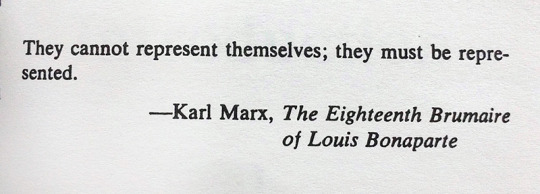
(Selection from ‘Orientalism’ by Edward Said)
“England has to fulfill a double mission in India: one destructive, the other regenerating—the annihilation of the Asiatic society, and the laying of the material foundations of Western society in Asia.” -Karl Marx, Surveys from Exile, ed. David Fernbach (London: Pelican Books, 1973), pp. 306–7
ORIENTALISM AND ITS METHOD
The reason I connect with Said is because of his political genius, and his subtle criticism of Western left especially within the universities. After migrating to the United States and pursuing his studies, he realized that in order to open the conversation about Palestinian liberation and the struggle for self-determination, he has to undo multiple levels of complexity. The first Gordian knot that needed to be untied was the problem of representation. The Middle East similar to the rest of Asia and Africa has been interpreted and represented to the Western audiences by European Orientalists. These academics and scholars perpetuated the pre-established system of domination. The discourse of Oriental studies (which some European countries such as Finland still have) helped pave the way for representing the East to the Western population through a process of racialization. Orientalism itself as an academic discourse became attainable by the military domination over the East. As Said argues on page 74 of the book, “...Orientalism is more particularly valuable as a sign of European-Atlantic power over the Orient than it is as a veridic discourse about the Orient (which is what, in its academic or scholarly form, it claims to be). (2)
Said brought out some uncomfortable topics for the white left inside and outside universities. Certain conversations regarding culture, race, individuality, and representation was considered nothing more than divisive by the established faculty. Suddenly, the middle-class white hippies in the universities had to fight their own whiteness alongside their forefathers’ business model, conservatism or Christianity. The repetitive conversations about capitalism by white folks got complicated considering the relationship between culture and colonial expansion. Part of Said’s work was to expose the overlapping connection between the history of European Anti-Semitism and postcolonial history.
Prior to the publication of Orientalism, the claim that “…every European, in what he could say about the Orient, was consequently a racist, an imperialist, and almost totally ethnocentric”, was something close to fiction. (1) White Leftists (in most cases men) would freely talk about the East with (or without) academic expertise and subsequently represent and translate the East to the Western world.
“Orientalism” and “Culture and imperialism” clarified that European imperialism created a situation where European scientists, artists, missionaries, soldiers, and traders became part of the same system despite their differences. Said talks about the colonial figures who advanced the racialization and subjugation of colonized peoples. Some of these figures are Jewish Zionists, and some are European artists, politicians, and settlers who uphold the colonial projects.
There is a huge list of Orientalist figures which Said brought to light and investigated in his works. The bibliography of Orientalism is digitalized on Goodreads. I cherry-picked one of these racist colonial writings in order to give an example of the type of research Said was digging up.
Here is Sir Thomas Tyrwhitt-Drake:
"The fear of the fellahin (Middle eastern agricultural laborer) that we have secret designs of re-conquering the country is a fruitful source of difficulty. This got over, remains the crass stupidity which cannot give a direct answer to a simple question, the exact object of which it does not understand; for why should a Frank wish to know the name of an insignificant wady or hill in their land?" The fellahin are all in the worst type of humanity that I have come across in the east...The fellah is totally destitute of all moral sense..." (2)
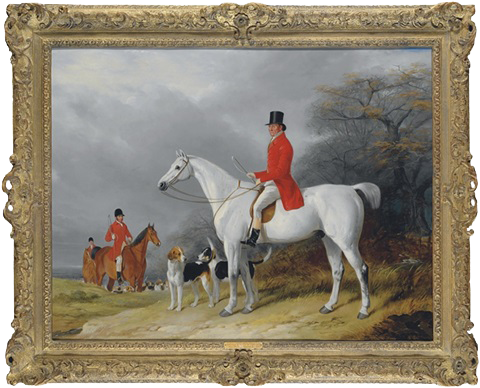
(Thomas Tyrwhitt-Drake, 1845, painted by William Barraud (1810–1850), source: Artnet)
“PALESTINE AND POLITICS OF MIDDLE EAST”
Aside from theoretical concepts we also learn a lot about the history of ethnic cleansing and atrocities that has been inflicted on the Middle East and in particular to Palestinians. We also come across many existential events such as the battle of Karameh in 1968, or the Sabra and Shatila refugee camps massacre in Lebanon which resulted in 2,062 deaths, or the events of 1948 where United Nations General Assembly Resolution 181 called for the partition of Palestine into a Jewish state and an Arab state. On page 34 of the book, after dismissing the passive idea that the colonialism of Palestine has resulted from a conflictual tragedy between two cultures/religions, Said goes to detail in explaining why the international left didn’t have much to offer Palestinians in 1967.
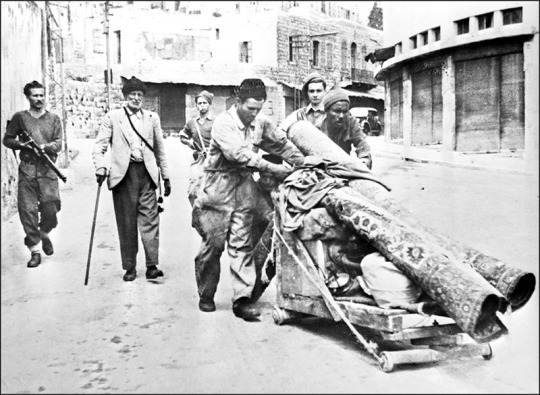
(Haganah fighters expel Palestinians from Haifa. May 12, 1948 -AFP/Getty Images)
Bib.
1. Smith, L.T. Decolonizing Methodologies: Research and Indigenous Peoples. London : Zed Books, 2012.
2. Said, Edward W. The Selected Works of Edward Said, 1966 - 2006. s.l. : Vintage, 2019. 0525565310.
3. Said, Edward W. Orientalism. s.l. : Vintage Books Edition, 1979.
❦❦❦
*Currently we have a media studio with a lot of expenses. We are independently critical without any state funding, and your support allows us to continue. If you like the content and want to become part of our community, please consider supporting us on Patreon or make a one-time donation through Paypal. 🙏
❦❦❦
13 notes
·
View notes
Link
In an amazing 1970 Life magazine interview with the PFLP's George Habash by Oriana Fallaci, Habash admits explicitly that he is targeting Jews, not Israelis or Zionists.
Here is how he justified airplane hijackings in Europe:
Countries like Germany, Italy, France and Switzerland, with many Jews among their population, allow their territory to be used as a base for the Jews to fight the Arabs. If Italy, for instance, is a base against the Arabs, the Arabs have a right to use Italy as a base against the Jews.
Fallaci, a real reporter, responded back with, "No, Dr. Habash, Italy is not used as a Jewish base, nor is Germany, France or Switzerland. "
Habash later on was even more explicit about the PFLP's targets:
The attacks of the Popular Front are based on quality, not quantity. We believe that to kill a Jew far from the battleground has more of an effect than killing 100 of them in battle; it attracts more attention. And when we set fire to a store in London, those few flames are worth the burning down of two kibbutzim.
In 1991, Jamal Nassar—currently a professor of political science, and dean emeritus, at Cal State-San Bernardino - wrote a book about the PLO where he changed the above quote to "To kill a Zionist far from the battleground has more of an effect than killing 100 of them in battle. "
Steven Lubet, a professor of law at Northwestern University, noticed this discrepancy and wrote to Nassar asking him why he changed the quote. His absurd answer:
I remember specifically discussing this issue with the late Professor Ibrahim Abu-Lughod who was a renowned expert on Palestinian affairs, a member of the Palestine National Council and former Chair of Political Science at Northwestern University. He told me that he posed the same question to Dr. George Habash who responded that everyone knows what he means, that is his use of the word Jews in that context refers to the Zionists who colonized the Palestinian homeland and those zionists (sic) in the Western World who finance and support that colonization. As such, the change of the word in the quotation was grounded in the intent of Dr. Habash. However, you are correct to point out such a change. I should have included an explanation in the reference.
An academic knowingly changed an explicitly antisemitic quote by a terrorist pioneer to make it appear only "anti-Zionist." But he didn't mention in his book that he modified the direct quote, and he lamely says that he should have explained his whitewashing in the book - which he never would have done in reality because it would have only called attention to his fabrication.
In other words, Nassar knew quite well that he was modifying a quote but he felt that it was all for the greater good and that he "knew" that when Habash said he wanted to target Jews in Europe he really was going to research his victims ahead of time to ensure that they support Israel.
His assertion that "everyone knows" Habash was not antisemitic is a lie as well. Even the Electronic Intifada admits in a glowing obituary that Habash bombed a synagogue when he was younger and says he was originally "anti-Jewish" although it claims, without proof, that his attitude towards Jews changed later.
Interestingly, the PFLP protested Fallaci's quote of Habash's antisemitism at the time, claiming that she fabricated it and he really said "Zionists." She responded sarcastically that "the so-called Department of Information ignores the existence of a machine known as a tape recorder” where she recorded the entire interview proving that Habash knew quite well that he was speaking about Jews into a microphone.
11 notes
·
View notes
Note
Hi! I'd be super interested to know which books were on the reading list for your class about Palestine! I study Middle Eastern Studies, and it would be really useful :) Thank you!! xx
Hi – here is the full list, including general background reading and the weekly reading for the classes.
General bibliography:
Kamal Abdel-Malek, The Rhetoric of Violence: Arab-Jewish Encounters in Contemporary Palestinian Literature and Cinema
Kamal Abdel-Malek and David Jacobson eds., Israeli and Palestinian Identities in History and Literature
Roger Allen, The Arabic Novel: an Historical and Critical Introduction
Hanan Ashrawi, Contemporary Palestinian Literature Under Occupation
Radwa Ashour, ‘Palestine and Jordan’ in Radwa Ashour, Ferial Ghazoul and Hasna Reda-Mekdashi, Arab Women Writers: A Critical Reference Guide, 1873-1999
Naseer Arari and Edmund Ghareeb eds., Enemy of the Sun: Poetry of Palestinian Resistance
Anna Ball, Palestinian Literature and Film in Postcolonial Feminist Perspective
Carol Bardenstein, ‘Raped Brides and Steadfast mothers: Appropriations of Palestinian Motherhood,’ in A. Jetter, ed., The Politics of Motherhood: Activist Voices from Left to Right
Ami Elad-Bouskila, Modern Palestinian Literature and Culture
Joe Cleary, Literature, Partition and the Nation-State: Culture and Conflict in Ireland, Israel and Palestine
Faisal Darraj, ‘Transformations in Palestinian Literature’
Ami Elad-Bouskila, Modern Palestinian Literature and Culture
A.M. Elmessirir, ed., The Palestinian Wedding: a Bilingual Anthology of Contemporary Palestinian Resistance Poetry
Sami Farsoun, Culture and Customs of the Palestinians
Rachel Brenner Feldhay, ‘“Hidden Transcripts’ Made Public: Israeli Arab Fiction and its Reception,’ Critical Inquiry 26.1
Rachel Brenner Feldhay, Inextricably Bonded: Israeli Arab and Jewish Writers Re-Visioning Culture
*Mahmud Ghanayim, The Quest for a Lost Identity: Palestinian Fiction in Israel
Sabry Hafez, The Genesis of Arabic Narrative Discourse
Tahrir Hamidi, ‘Bearing Witness in Palestinian Resistance Literature’ Race and Class 52.3
Barbara Harlow, Resistance Literature
Adina Hoffman, ‘Recollecting the Palestinian Past,’ Raritan
Runo Isaksen, Literature and War: Conversations with Israeli and Palestinian Writers
Salma K, Jayyusi, ‘Introduction: Palestinian Literature in Modern Times’, in Jayyusi, ed., Modern Palestinian Literature: an Anthology
John Maher, Slouching towards Jerusalem: Reactive Nationalism in the Irish, Israeli and Palestinian Novel
Stefan Meyer, The Experimental Arabic Novel: Postcolonial Literary Modernism in the Levant
Lindsey Moore, Arab, Muslim, Woman: Voice and Vision in Postcolonial Literature and Film
Shmuel Moreh, ‘Arabic Literature in Israel,’ in Shmuel Moreh, ed., Studies in Modern Arabic Prose and Poetry
Barbara McKean Parmenter, Giving Voices to Stone: Place and Identity in Palestinian Literature
Edward Said, After the Last Sky: Palestinian Lives
Ihab Saloul, Catastrophe and Exile in the Modern Palestinian Imagination: Telling Memories
Rebecca Stein and Ted Swedenburg eds., Palestine, Israel, and the Politics of Popular Culture
Yasir, Suleiman and Ibrahim Muhawi, eds. Literature and Nation in the Middle East
Ibrahim Taha, The Palestinian Novel
Anastasia Vassalopoulos, Contemporary Arab Women Writers: Cultural Expression in Context
Ibrahim Abu-Lughod, The Transformation of Palestine
George Antonius, The Arab Awakening; the Story of the Arab National Movement
Robert Bowke, Palestinian Refugees: Mythology, Identity and the Search for Peace
Nathan J. Brown, Palestinian Politics after the Oslo Accords: Resuming Arab Palestine
Chomsky, Noam, The Fateful Triangle: the United States, Israel and the Palestinians
Samih Farsoun, Palestine and the Palestinians: A Social and Political History
Gregory Harms, The Palestine-Israel Conflict: a Basic Introduction
Doreen Ingrams, Palestine Papers 1917-1922: Seeds of Conflict
Gudrun Kramer, A History of Palestine from the Ottoman Conquest to the Founding of the State of Israel
Rashid Khalidi, Palestinian Identity: The Construction of Modern National Consciousness
Rashid Khalidi, The Iron Cage: the Story of the Palestinian Struggle for Statehood
Walid Khalidi, Before their Diaspora: a Photographic History of the Palestinians 1876-1948
Mushtaq Husain Khan et al (eds.), State Formation in Palestine: Viability and Governance during a Social Transformation
Ronit Lentin, Thinking Palestine
U. Makdisi and P. Silverstein, Memory and Violence from the Middle East and North Africa
Beverley Milton-Edwards, Islamic Politics in Palestine
Ilan Pappé, A History of Modern Palestine: One Land, Two Peoples
Wendy Pearlman, Violence, Nonviolence, and the Palestinian National Movement
Mazin Qumziyeh, Popular Resistance in Palestine: a History of Hope and Empowerment
Avi Shlaim, The Iron Wall: Israel and the Arab World
Helena Schulz, The Palestinian Diaspora: Formation of Identities and Politics of Homeland
Yezid Sayigh, Armed Struggle and the Search for a State: The Palestinian National Movement, 1949-1993
Tom Segev, One Palestine Complete: Jews and Arabs Under the British Mandate
Mai Yamani, ed., Feminism and Islam
Weekly reading for the course:
1
Edward Said, The Question of Palestine
Anna Barnard, ‘Palestine and Postcolonial Studies’
Aijaz Ahmad: ‘Literature Among the Signs of Our Time’ from In Theory: Classes, Nations, Literatures
Salah D. Hassan, “Undertaking Partition: Palestine and Postcolonial Studies,” Journal X 6.1
Abdirahman Hussein, Edward Said: Criticism and Society
Neil Lazarus, Nationalism and Cultural Practice in the Postcolonial World
Joseph Massad, The Persistence of the Palestinian Question
2
S. Yizhar: Khirbet Khizeh
Benny Morris, ‘The Second Wave: the Mass Exodus, April-June 1984,’ in The Birth of the Palestinian Refugee Problem, 1947-1949
Saleh Jawal, ‘Zionist Massacres: the Creation of the Palestinian Refugee Problem in the 1948 War’ in Eyal Benvenisti et al eds. Israel and the Palestinian Refugees
Uri Avnery, 1948: a Soldier’s Tale: the Bloody Road to Jerusalem
Adnan Abu-Ghazaleh, ‘The Impact of 1948 on Palestinian Arab Writers,’ Middle East Forum 2-3
Menachem Begin, The Revolt, revised ed., trans. S. Katz
Rachel Brenner Feldhay, ‘The Traumas of Victory and Defeat’ in Feldhay, Inextricably Bonded: Israeli Arab and Jewish Writers Re-Visioning Culture
Walid Khalidi, Before their Diaspora: a Photographic History of the Palestinians 1876-1948
Nur Masalha, Catastrophe Remembered: Essays in Memory of Edward W. Said
Nur Masalha, ‘Debate on the 1948 Exodus: A Critique of Benny Morris’, Journal of Palestine Studies 21, No.1. This debate involves Nur Masalha, Benny Morris and Norman Finkelstein
Nur Masalha, Expulsion of the Palestinians: The Concept of ‘Transfer’ in Zionist Political Thought, 1882-1948
Nur Masalha, ‘Remembering the Palestinian Nakba: Commemoration, Oral History and Narratives of Memory���, Holy Land Studies: A Multidisciplinary Journal 7, No.2
Benny Morris, The Birth of the Palestinian Refugee Problem, 1947-1949
Benny Morris, The Birth of the Palestinian Refugee Problem Revisited – see especially ‘The Idea of “Transfer” in Zionist thinking before 1948,’
Ilan Pappé, The Ethnic Cleansing of Palestine
Ahmad H. Saa’di and Lila Abu-Lughod (eds.) Nakba: Palestine , 1948, and the Claims of Memory
Ahmad Sa’adi, ‘Remembering Al-Nakba in a Time of Amnesia,’ Interventions
Ihab Saloul, Catastrophe and Exile in the Modern Palestinian Imagination: Telling Memories
Ari Shavit, ‘Interview with Benny Morris - Survival of the Fittest - 01.11.04’
Susan Slyomovics, The Objects of Memory: Arab and Jew Narrate the Palestinian Village
Fawaz Turki, ‘Reflections on Al-Nakba,’ Journal of Palestine Studies
3
Ghassan Kanafani: Men in the Sun and other Palestinian Stories
seminar essay: Benny Morris, ‘Blocking a Return,’ from The Birth of the Palestinian Refugee Problem Revisited
Robert Bowke, Palestinian Refugees: Mythology, Identity and the Search for Peace
Joe Cleary, Literature, Partition and the Nation-State: Culture and Conflict in Ireland, Israel and Palestine
Anni Kanafani, Ghassan Kanafani
Hilary Kilpatrick, ‘Tradition and Innovation in the Fiction of Ghassan Kanafani,’ Journal of Arabic Literature 7
Mary Layoun, Travels of a Genre: the modern novel and ideology
Nur Masalha, Expulsion of the Palestinians: The Concept of ‘Transfer’ in Zionist Political Thought, 1882-1948
Nur Masalha, ‘Debate on the 1948 Exodus: A Critique of Benny Morris’, Journal of Palestine Studies 21, No.1. This debate involves Nur Masalha, Benny Morris and Norman Finkelstein
Benny Morris, The Birth of the Palestinian Refugee Problem, 1947-1949
Benny Morris, The Birth of the Palestinian Refugee Problem Revisited
Edward Said, After the Last Sky: Palestinian Lives
Muhammed Siddiq, Man is a Cause: Political Consciousness in the Fiction of Ghassan Kanafani
Amy Zalman, ‘Gender and the Palestinian Narrative of Return in Two Novels by Ghassan Kanafani,’ in Y Suleiman and I Muhawi, eds., Literature and Nation in the Middle East
4
Emile Habibi: The Secret Life of Saeed the Pessoptomist
Nadim N. Rouhana ,Palestinian Citizens in an Ethnic Jewish State: Identities in Conflict
Nur Masalha, ‘Present Absentees and Indigenous Resistance,’ in Nur Masalha, ed., Catastrophe Remembered: Palestine, Israel and the Internal Refugees: Essays in Memory of Edward W Said
Alexander Bligh, ed. The Israeli Palestinians: An Arab Minority in the Jewish State
Ami Elad-Bouskila, Modern Palestinian Literature and Culture
Rachel Brenner Feldhay, ‘“Hidden Transcripts’ Made Public: Israeli Arab Fiction and its Reception,’ Critical Inquiry 26.1
Mahmud Ghanayim, The Quest for a Lost Identity: Palestinian Fiction in Israel
David Grossman, Sleeping on a Wire: Conversations with Palestinians in Israel
Sabri Jiryis, The Arabs in Israel
Akram Khateb, ‘Emile Habiby: the Mirror of Irony in Palestinian Literature,’ Journal of Arabic Literature 24.1
Trevor Le Gassick. ‘The Luckless Palestinian,’ Middle East Journal 34.2
Nur Masalha, A Land Without a People
Nur Masalha, ed., Catastrophe Remembered: Palestine ,Israel and the Internal Refugees: Essays in Memory of Edward W. Said
Nadim N. Rouhana ,Palestinian Citizens in an Ethnic Jewish State: Identities in Conflict
Ilan Pappe, The Forgotten Palestinians: A History of the Palestinians in Israel
Nadim Rouhana and A. Ghanem, ‘The Democratization of a Traditional Minority in an Ethnic Democracy: The Palestinians in Israel ’, in Edy Kaufman, S. Abed and R. Rothstein (eds.), Democracy, Peace and The Israeli-Palestinian Conflict
Adnan L. Sa'di, The Arabic Novel in Israel: a Critical Study of the Works of Emile Habiby
Jonathon Scott, ‘The Miracle of Emile Habiby’s Pessoptomist,’ College Literature 37.1
Sammy Smooha, ‘Advances and Limits of the Israelization of Israel’s Palestinian Citizens,’ in Kamal Abdel-Malek and David Jacobson eds., Israeli and Palestinian Identities in History and Literature
Ben White, Palestinians in Israel: Segregation, Discrimination and Democracy
Elia Zureik, The Palestinians in Israel: A Study in Internal Colonialism
5
David Grossman, The Yellow Wind
Raja Shehadeh, Palestinian Walks: Notes on a Vanishing Landscape
Eyal Weizman, Hollow Land: Israel’s Architecture of Occupation
Jonathan Cook, Disappearing Palestine: Israel’s Experiments in Human Despair
Rafik Halabi, West Bank Story
Frances Hasso, Resistance, Repression, and Gender Politics in Occupied Palestine and Jordan
Saree Makdisi, Palestine Inside Out: an Everyday Occupation
Suha Sabbagh, ed. Palestinian Women of Gaza and the West Bank
Charlotte Salmi, 'Reflections on a National Cartography: the Freedom to Roam and the Right to Imagine in Raja Shehadeh’s Travel Writing,’ Journal of Postcolonial Writing 48.4
Avi Shlaim, Collusion across the Jordan: King Abdullah, the Zionist Movement, and the Partition of Palestine
Eyal Weizman, Hollow Land: Israel’s Architecture of Occupation
7 (no reading for 6)
Elias Khoury: Gate of the Sun
Rosemary Sayigh, Palestinians: From Peasants to Revolutionaries
B. Hanrahan, ‘The Key to Memory: An Interview with Elias Khoury’ Open Democracy April 19, 2006
Elias Khoury, 'In Defence of Metaphor,’ in Kamal Boullata, ed., Belonging and Globalisation: Criticvaql Essays in Contemporary Art and Culture
Elias Khoury, 'Rethinking the Nakba,’ Critical Inquiry 38.2
Elias Khoury, 'The Unfolding of Modern Fiction and Arab Memory,’ The Journal of the Mid-West Modern Languages Association 23.1
Mahmoud Darwish, Memory for Forgetfulness, August, Beirut, 1972.
Ari Folman (dir), Waltzing with Bashir (2008)
Leila Khaled, My People Shall Live:the Autobiography of a Revolutionary ed. George Hajjar
Elias Khoury, 'The Unfolding of Modern Fiction and Arab Memory,’ Journal of the Midwest Modern Language Association 23.1
Julie Peteet, Gender in Crisis: Women and the Palestinian Resistance Movement
Edward Said, After the Last Sky : Palestinian Lives
Rosemary Sayigh, Too Many Enemies: Palestinian Experience in Lebanon
8
Hani Abu-Assad (dir), Paradise Now (2005)
Mahmoud Darwish, Mural
Diego Gambetta, ed., Making Sense of Suicide Missions
Mahmoud Darwish, Memory for Forgetfulness, August, Beirut , 1982.
Kamal Abdel-Malek, The Rhetoric of Violence: Arab-Jewish Encounters in Contemporary Palestinian Literature and Cinema
Livia Alexander, 'Is there a Palestinian Cinema?’ in Rebecca Stein and Ted Swedenburg, eds., Palestine, Israel, and the Politics of Popular Culture
Ramzy Baroud, The Second Palestinian Intifada
Hamid Dabashi: Dreams of a Nation: On Palestinian Cinema
Nurith Gertz and George Khleifi, Palestinian Cinema: Landscape, Trauma and Memory
Barbara Harlow, Resistance Literature
Michael Jensen, The Political Ideology of Hamas
Nur Masalha, ‘Present Absentees and Indigenous Resistance’ in Nur Masalha, Catastrophe Remembered: Palestine, Israel and the Internal Refugees: Essays in Memory of Edward W. Said
Hala Nasser and Najat Rahman, Mahmoud Darwish: Exile’s Poet
Rosemary Sayigh, Palestinians: From Peasants to Revolutionaries
9
Joe Sacco: Footnotes in Gaza
Jan Baetens, ed. The Graphic Novel
Ramzy Baroud, My Father was a Freedom Fighter: Gaza’s Untold Story
Mordechai Bar-On, The Gates of Gaza :Israel ’s Road to Suez and Back, 1955-57
Biography special issue on 'Autographics’ http://uhpjournals.wordpress.com/2008/07/07/biography-vol-31-no-1-2008-autographics/ – see especially Gardner, Jared. ‘Autography’s Biography’ Biography 31.1
Gerald Butt, Life at the Crossroads: a History of Gaza
Ilana Feldman, Governing Gaza : Bureaucracy, Authority, and the ‘Work of Rule’, 1917-1967
Mary Layoun, 'Telling Stories in Palestine: Comix Understanding and Narratives of Palestine-Israel’ in Rebecca Stein and Ted Swedenburg, eds., Palestine, Israel, and the Politics of Popular Culture
Scott McCloud, Understanding Comics: the Invisible Art
Roger Sabin, Comics, Comix & Graphic Novels
Joe Sacco, Palestine
Jonathon Scott, ‘Angel of Palestine,’ Race and Class 52.3
Dirk Vanderbeke, 'In the Art of the Beholder: Comics as Political Journalism,’ in Mark Berninger et al eds., Comics as a Nexus of Cultures: Essays on the Interplay of Media, Disciplines and International Perspectives
Sara van Ness, Watchman as Literature: a Critical Study of the Graphic Novel
Tristram Walker, 'Graphic Wounds: the Comics JOurnalism of Joe Sacco,’ in John Skinner, ed., Writing the Dark Side of Travel
Gillian Whitlock, ‘Autographics: the Seeing “I” of the Comics,’ Modern Fiction Studies 52.4
Gina Poletti, ‘Self-Regarding Arts,’ Biography 31.1
10
Suad Amiry: Sharon and My Mother-in-Law: Ramallah Diaries
Simona Sharoni, Gender and the Israeli-Palestinian Conflict
Ellen Fleischmann, The Nation and its “New Women”: the Palestinian Women’s Movement, 1920-1948
Frances Hasso, Resistance, Repression, and Gender Politics in Occupied Palestine and Jordan
Jad Islah, ‘From Salons to the Popular Committees: Palestinian Women, 1919-1989,’ in Ilan Pappe (ed.), The Israel/Palestine Question: Rewriting Histories
Penny Johnson and Eileen Kuttab, ‘Where have all the Women (and Men) gone? Reflections on Gender and the Second Intifada,’ Feminist Review 69
Deniz Kandiyoti, ed., Kandiyoti, ed., Gendering the Middle East: Emerging Perspectives
Sheila Katz, Women and Gender in Early Jewish and Palestinian Nationalism
Tamar Meyer, Women and the Israeli Occupation: the Politics of Change
Julie Peteet, Gender in Crisis: Women and the Palestinian Resistance Movement
Cheryl Rubenberg, Palestinian Women: Patriarchy and Resistance in the West Bank
Suha Sabbagh, ed. Palestinian Women of Gaza and the West Bank
Rosemary Sayigh, ‘Women’s Nakba Stories’ in Ahmad Sa’di H. and Lila Abu-Lughod, eds., Nakba: Palestine , 1948, and the Claims of Memory
#ask#anonymous#palestine#masters#ma#postgrad#gradblr#long#books#b#bookstagram#bookblr#booklr#reference#masterpost
489 notes
·
View notes
Text
Gagnez 50000 $ avec le prix Ibrahim Abu-Lughod en études palestiniennes à Columbia University
Gagnez 50000 $ avec le prix Ibrahim Abu-Lughod en études palestiniennes à Columbia University
Le Centre d’études sur la Palestine de l’Institut du Moyen-Orient de l’Université Columbia est heureux d’annoncer ce concours international. Le prix soutiendra un chercheur travaillant sur un projet de livre dans n’importe quel domaine des sciences humaines ou sociales qui passera l’année universitaire à l’Université Columbia à New York, poursuivant ses recherches et ses écrits, contribuant aux…
View On WordPress
0 notes
Text
Lughod Post-doctoral Award 2020-2021 at Columbia University (Stipend of $50,000)
Deadline: January 15, 2020
Applications are invited for the Ibrahim Abu-Lughod Award in Palestine Studies 2020-2021 at Columbia University. The award recognizes and seeks to foster innovative and groundbreaking scholarship on issues related to Palestine and Palestinians. The award will support a post-doctoral scholar working on a book project in any field of the humanities or social sciences.
The Fellow will spend the academic year at Columbia University, pursuing her or his research and writing, contributing to curricular matters, and participating in the intellectual life of the Center for Palestine Studies at the Middle East Institute. The Fellow will present a seminar in the colloquium series and contribute to other public events organized by CPS, and may be invited to speak at other universities in the United States.
Established in 2010, the IAL Award is made possible through the generosity of the late Abdel Mohsin Al-Qattan in honor of his friend, the Palestinian scholar and intellectual, Ibrahim Abu-Lughod (1929-2001). Their close friendship began in the aftermath of the Nakba of 1948 and evolved into a shared commitment to justice for Palestinians to be realized through support for excellence in higher education and scholarship. The IAL Award also is supported by other donors and by the Arts & Sciences at Columbia University.
Stipend
The Award carries a stipend of $50,000 for the academic year.
Eligibility
Open to all post-doctoral scholars who share the mission of the Center for Palestine Studies to advance the production and circulation of knowledge on Palestinian history, culture, society, and politics through outstanding scholarship.Preference will be given to individuals from underrepresented programs who would benefit most from the academic resources of Columbia University. The Fellow may not hold any other major fellowship or teaching obligations during the award period.The Fellow must have a PhD in hand by June 2020.
Application
The following list of materials is required for all applicants:
Completed Online Application found here.Curriculum vitae. Should include Education (names and location of colleges, graduate and professional schools, with dates attended and degrees earned); Employment; Academic honors; Publications (Please do not send the publications); Languages read, spoken and written.Three-page (1000 word) description of the book project on which fellow will work and its significance. Indicate how much has been completed and what you intend to do during the fellowship period.Writing sample (15 pg max). Can be an extract from a longer work.Two letters of recommendation. Recommendations should come from scholars familiar with the proposed project and the applicant’s qualifications. Recommendations must be submitted only by recommenders here by January 15, 2020. Applicants are responsible for requesting the letters.
Application materials and recommendations should be submitted in PDF format on or before January 15, 2020.
Read the full article
0 notes